Any links to online stores should be assumed to be affiliates. The company or PR agency provides all or most review samples. They have no control over my content, and I provide my honest opinion.
The Netgear Orbi RBKE960 WiFi 6E mesh system was announced back in October and was the first mesh system on the market to implement a quad bands radio.
The benefit of this is that you have one dedicated 5Ghz band for backhaul, then 2.4Ghz, 5Ghz and the new 6Ghz band used by WiFi 6E for the client.
The downside to this is that Netgear has basically taken the £1000 Orbi RBK853 WiFI 6 system, upgrading it with the new 6Ghz band increasing the price to a massive £1500, making it the most expensive consumer WiFi system on the market by a long way.
The law of diminishing returns always applies to cutting edge high-end products, so criticising the price is a bit moot. Nothing competes with this system, if you want the best of the best, you have to pay for it.
Specification
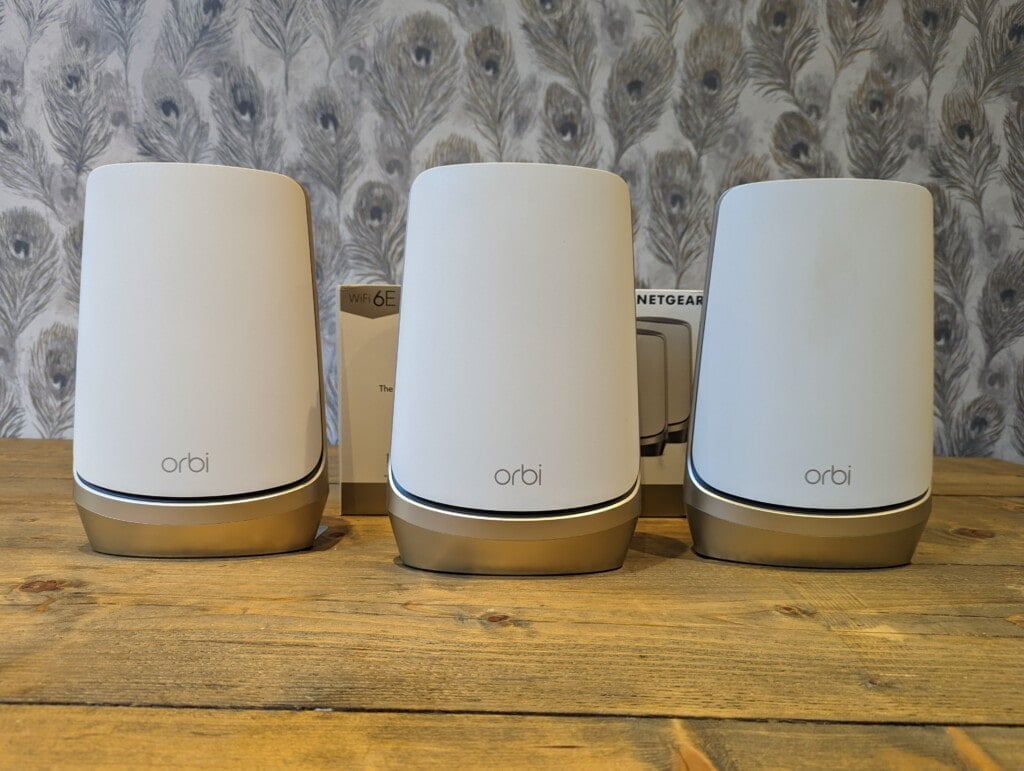
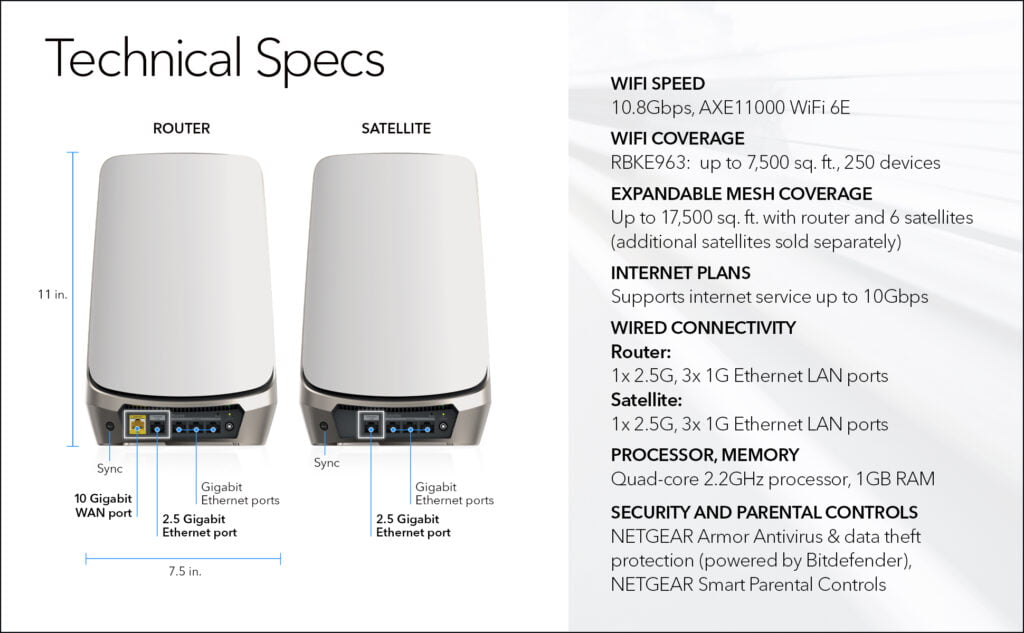
Advantages of 6Ghz WiFI 6E vs 160Mhz 5Ghz WiFi 5
Further down in my review, you will see that the new fancy 6Ghz band only has a small gain over running your 5Ghz band in 160Mhz, so what’s the point of spending all this money on WiFi 6E?
The 5Ghz band is quite congested and also has to radar by using dynamic frequency selection, this limits the number 160Mhz bands down to just 2. I struggle to get two 160MHz working together, so in my house, I have one access point running at 160Mhz and everything else on 80MHz.
With 6Ghz, it has a total of 14 channels at 80Mhz or 7 at 160Mhz and doesn’t need to worry about DFS as much. This means you can run multiple access points using 6Ghz with 160Mhz channel width with no problems at all.
The maximum speeds capable haven’t been improved. It is just much easier to achieve them.
Because 160Mhz is much easier to achieve now, this is the first Netgear Orbi that allows the client to connect with this channel width and, therefore, the first Orbi that has ever been able to achieve multigigabit network transfers.
Features
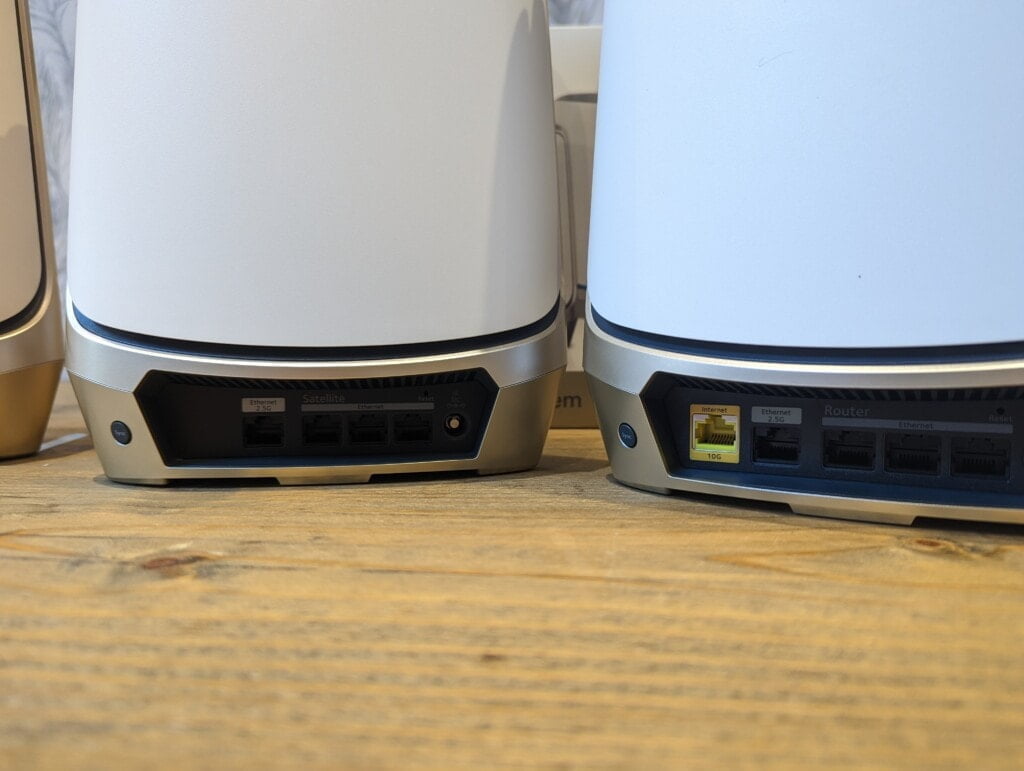
The Netgear RBKE963 system comes in a giant box. Each unit looks very similar to the previous flagship WiFI 6 RBK853 product, are a bit larger.
As far as WiFi systems go, these are about as attractive as you get, and you can now order them in Black.
The overall design and features are similar to the older RBK853, but there is one big upgrade other than the 6Ghz band.
The router now comes with a 10 gigabit WAN port, then 2.5 gigabit and 3 gigabit LAN ports. Each satellite has one 2.5 gigabit and three gigabit LAN ports.
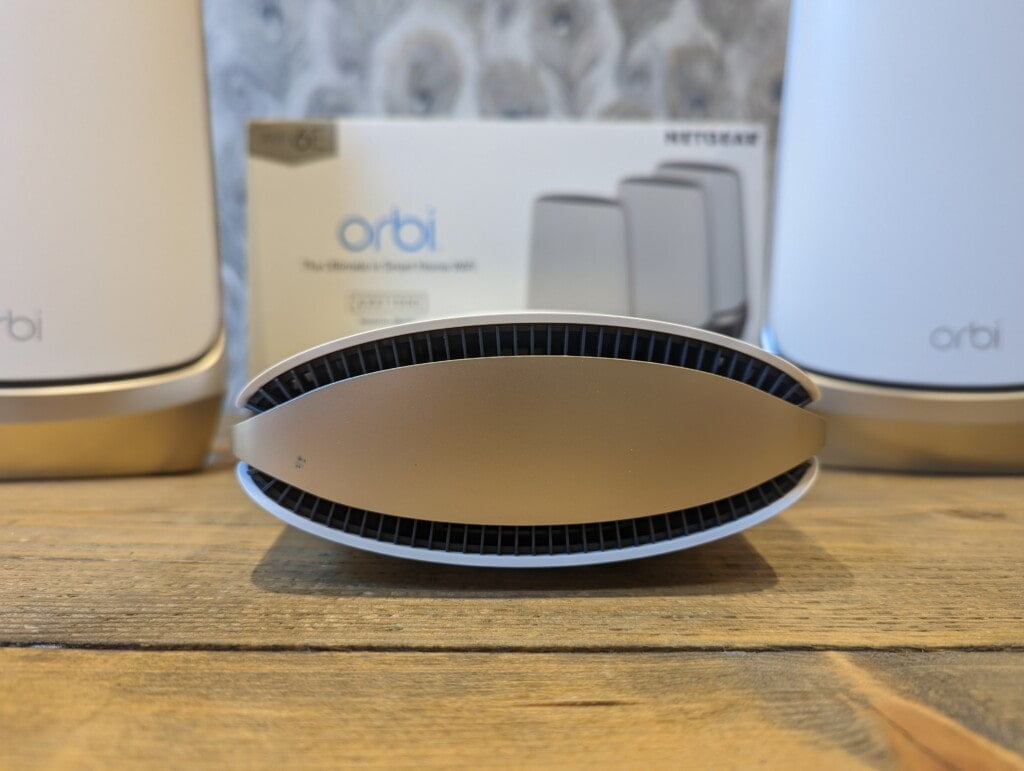
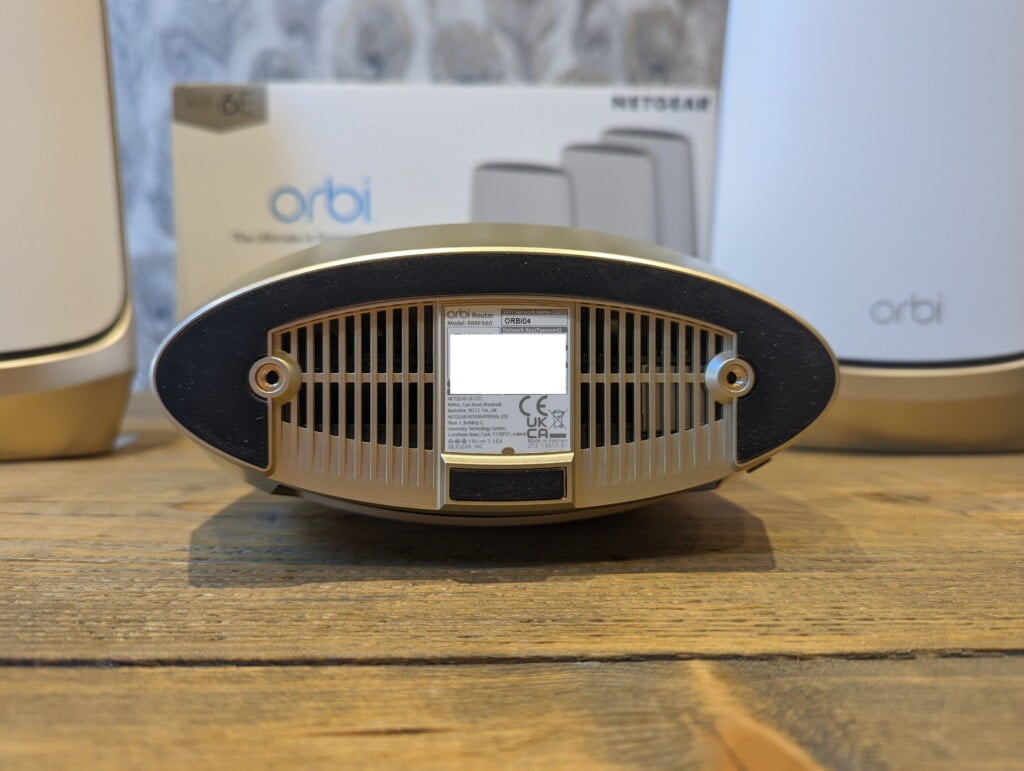
Therefore this system is geared up to work out of the box with multi-gigabit LANs. I’d have prefered to see 2x10Gbps on the router. If you are ever lucky enough to have a faster than 2.5Gbps Internet, it is going to get throttled by the LAN port.
On the base of each Orbi is two mounting holes for wall mounting brackets, which are included with the Netgear Orbi Pro hardware.
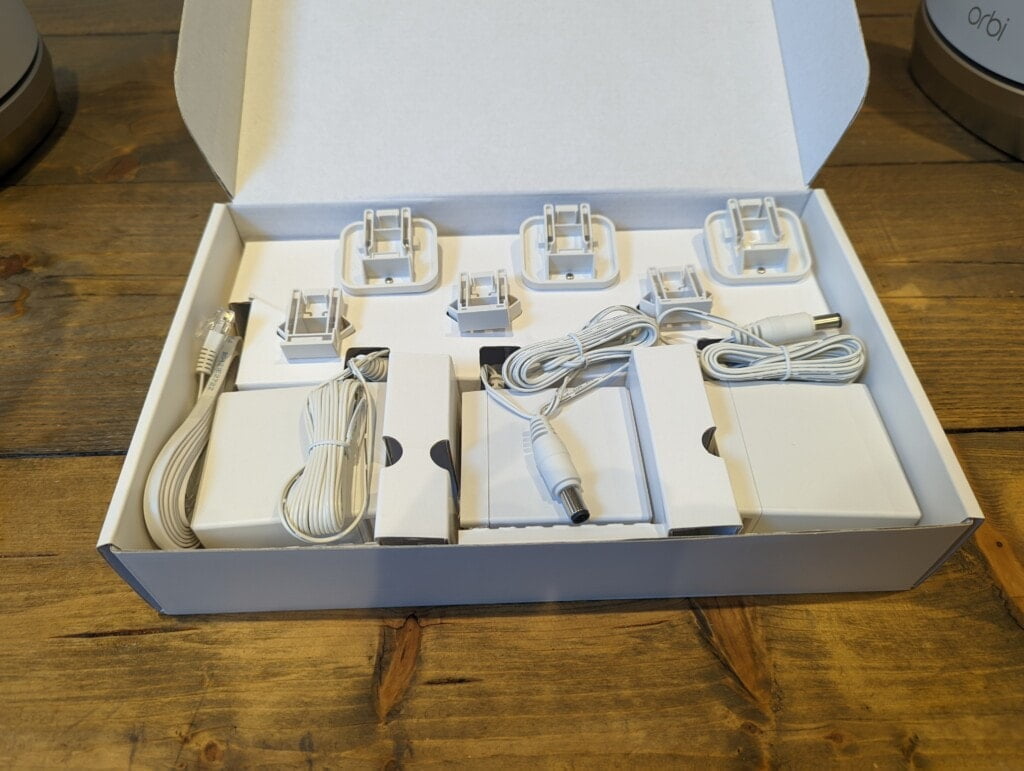
Set-Up
I set everything up via the Orbi App, which is likely what most people do. The Orbi’s are pre-paired, and I find it best to plug everything in first then go through the set-up process. Therefore when you get to the end, all the Orbi’s have identified each other, and it just works
The Orbi app is quite restrictive in terms of settings. Once everything is paired up, the only control you have is the SSID and password.
When you register the device, you will also be subscribed to Netgear Armor for free for one month.
Settings – Orbi App and Web
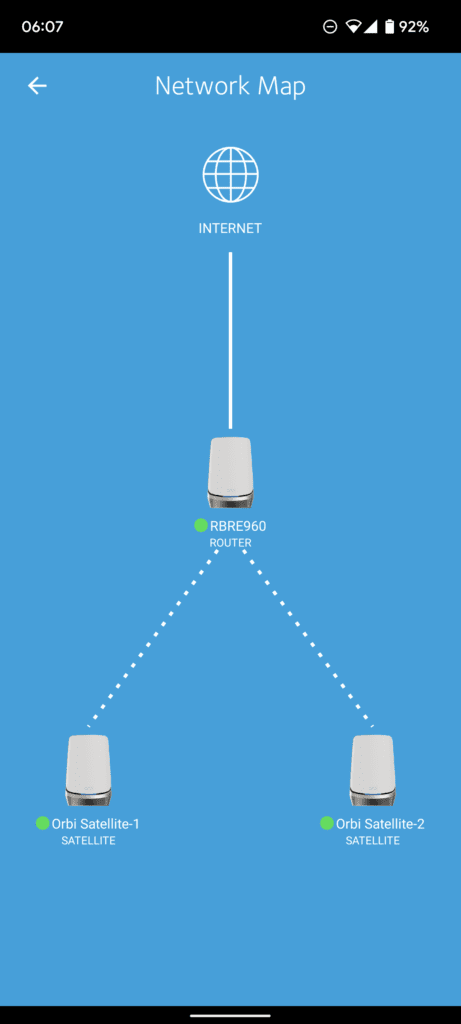
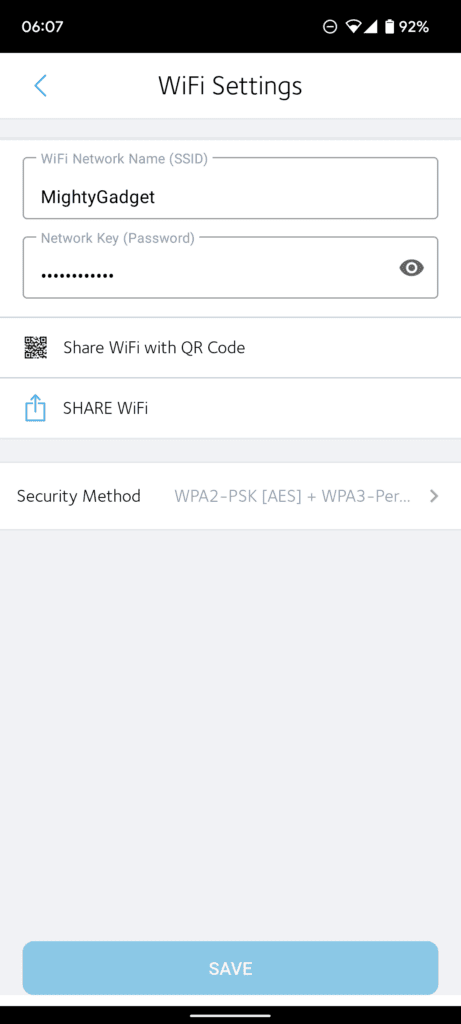
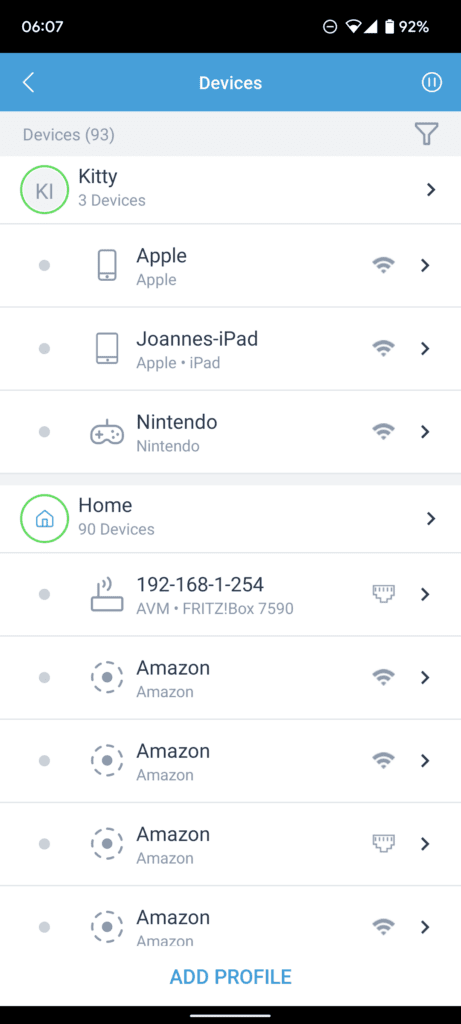
The Orbi app is about as basic as it gets when it comes to your system settings. The only things you can really do are change the SSID name and password.
It is possible to enable remote management in the app, but this is not available via the web interface.
The two features that are built-in are Netgear Armor and Smart Parental Controls, both of which are subscription services with a free one month trial.
Smart Parental Control
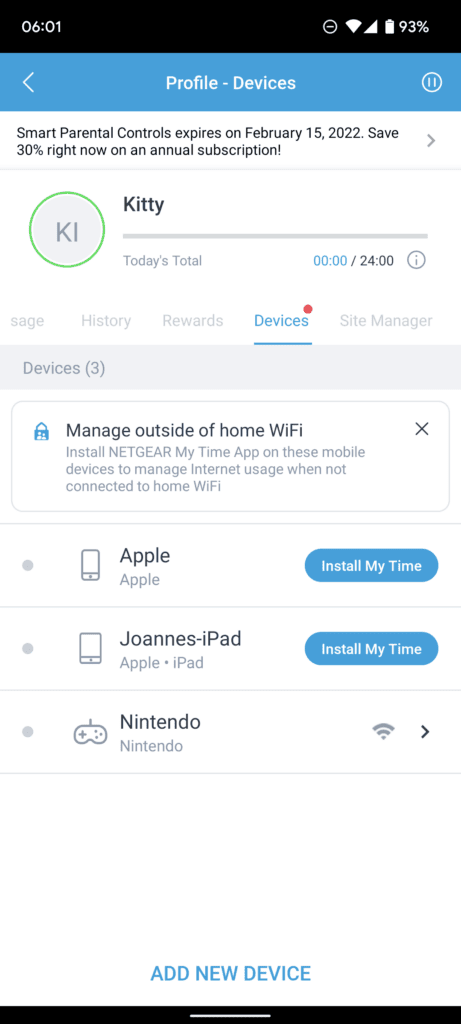


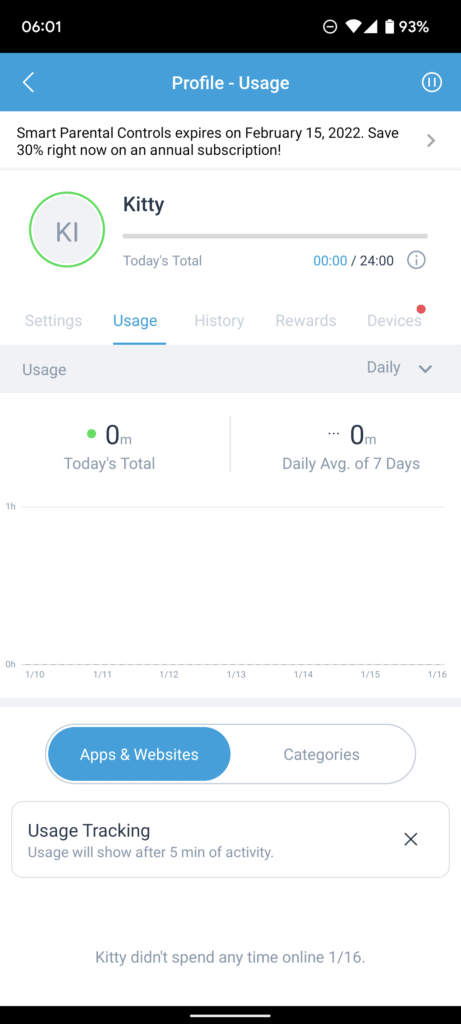
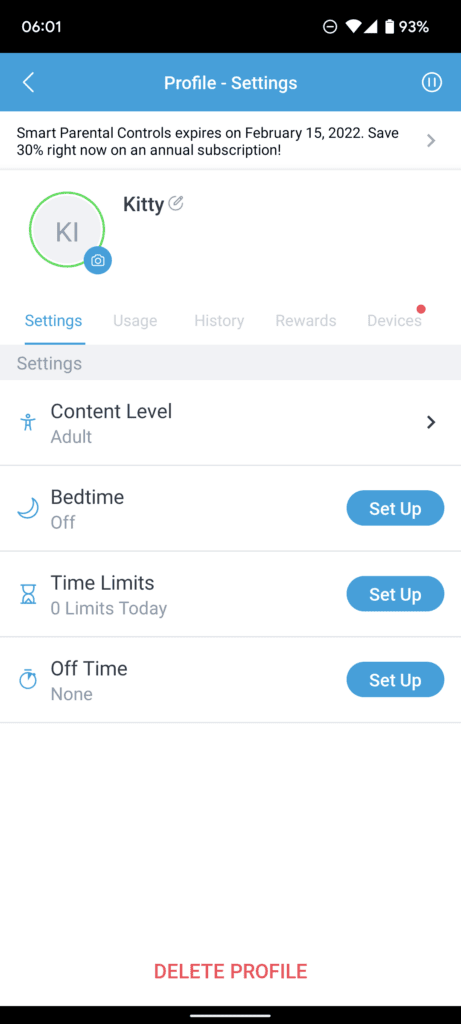

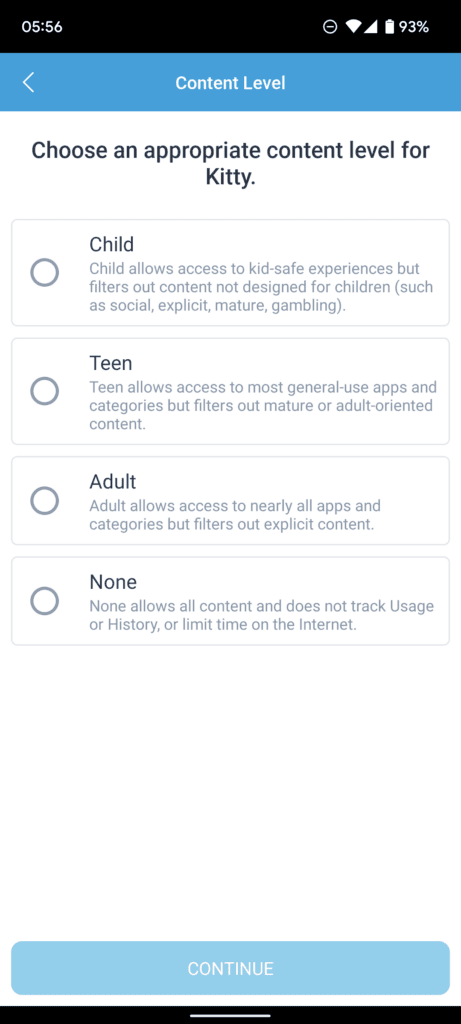
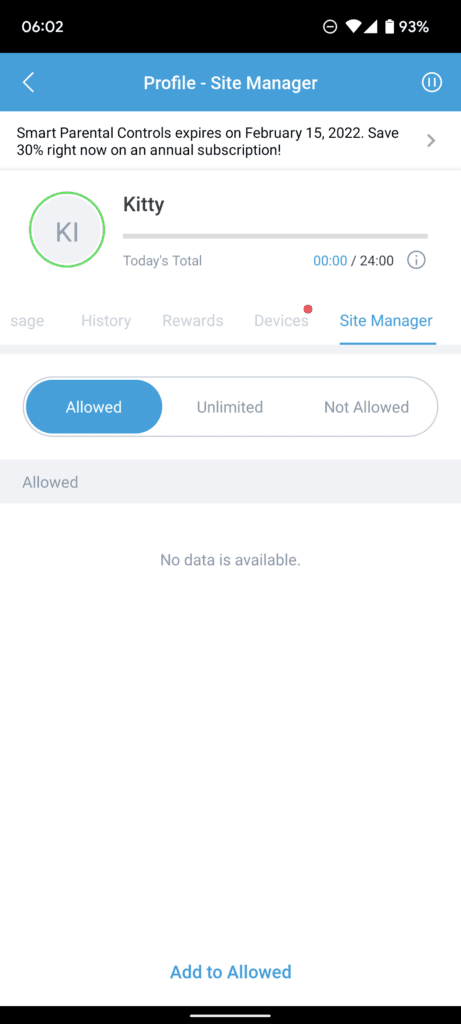
I don’t have kids, so this feature is useless to me, but I set up a basic profile to go through the settings. It does look quite useful. You have the option to set up a specific profile for each child, select their age group and the devices they use.
With this profile, you can define time limits, accessible content, bedtime, and off time. You can also monitor usage
Netgear Armor
Netgear Armor provides network-level security that will scan your devices for vulnerabilities and black websites that could be malicious.
It is priced at £84.99 per year, so quite expensive, but If you are buying a £1500 plug and play mesh system, this may not phase you. The subscription also includes licences for Bitdefender Security which can be installed on PC or mobile devices.
Web Interface
The web interface is required if you want to do anything slightly advanced with your network settings. This includes things like Dynamic DNS, VPN, IP address reservation, port forwarding and many others.
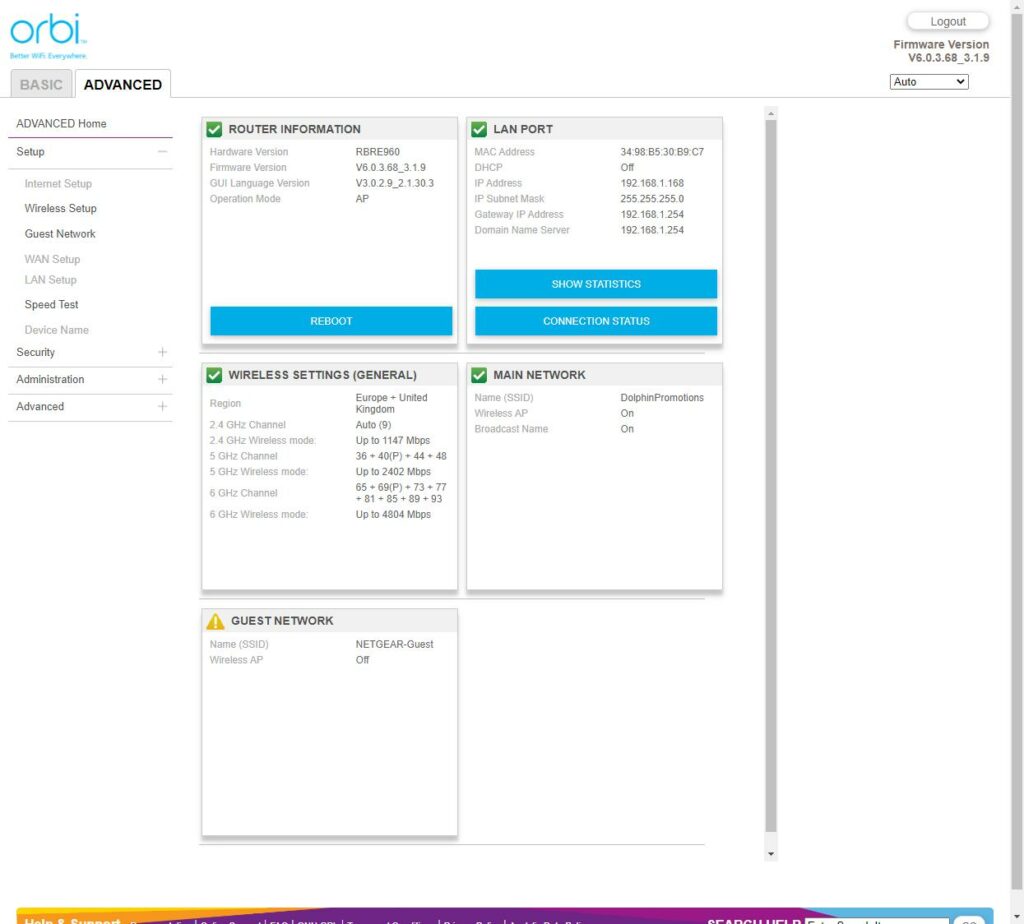
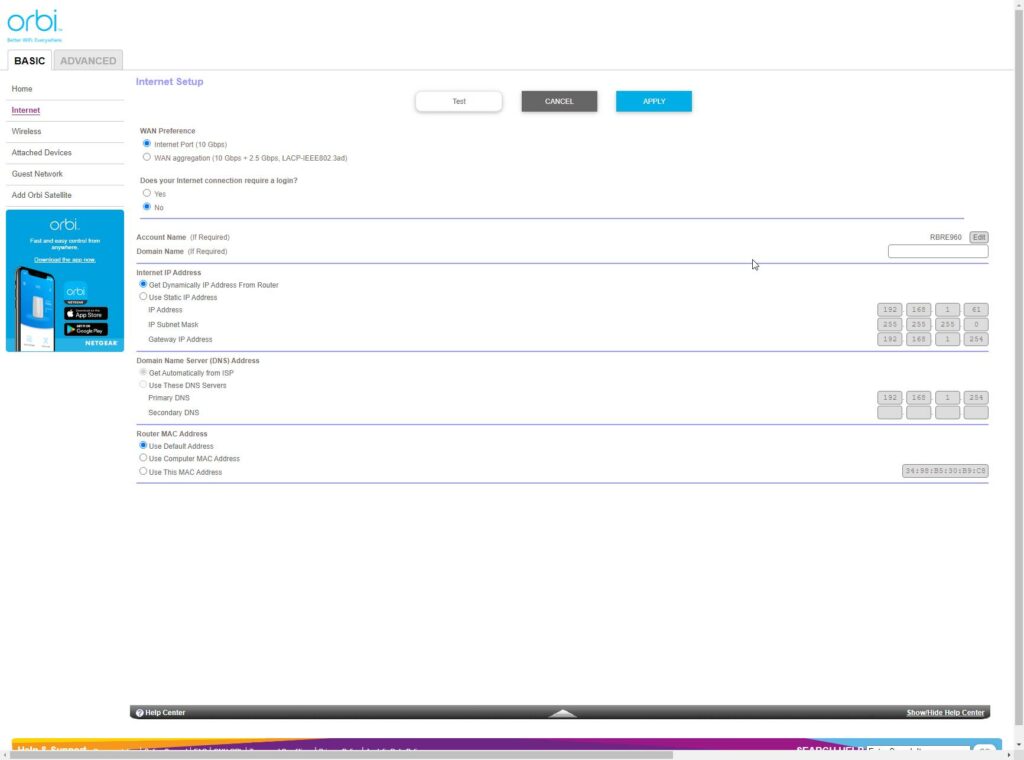
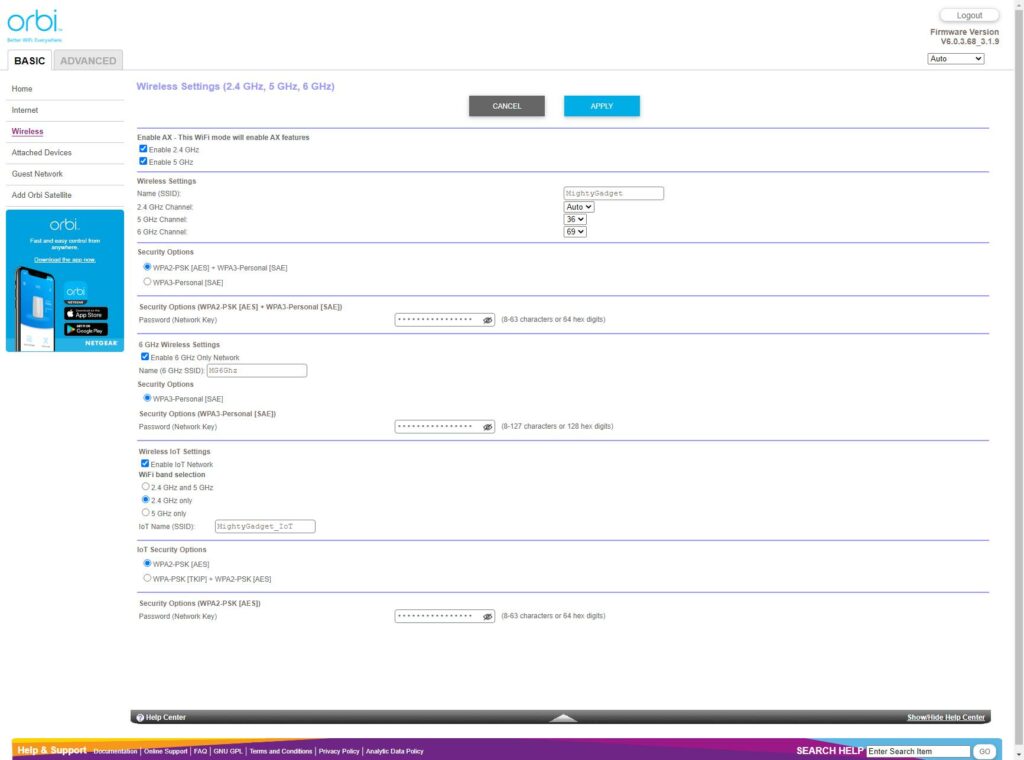
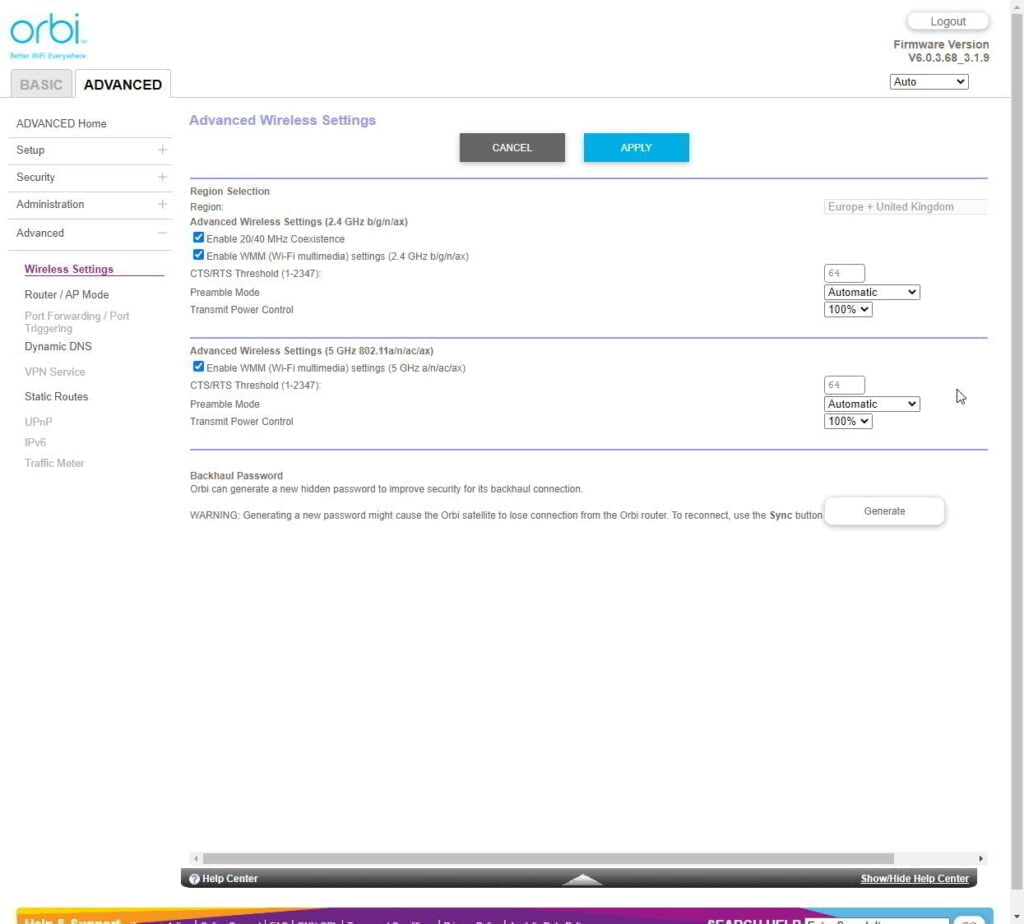
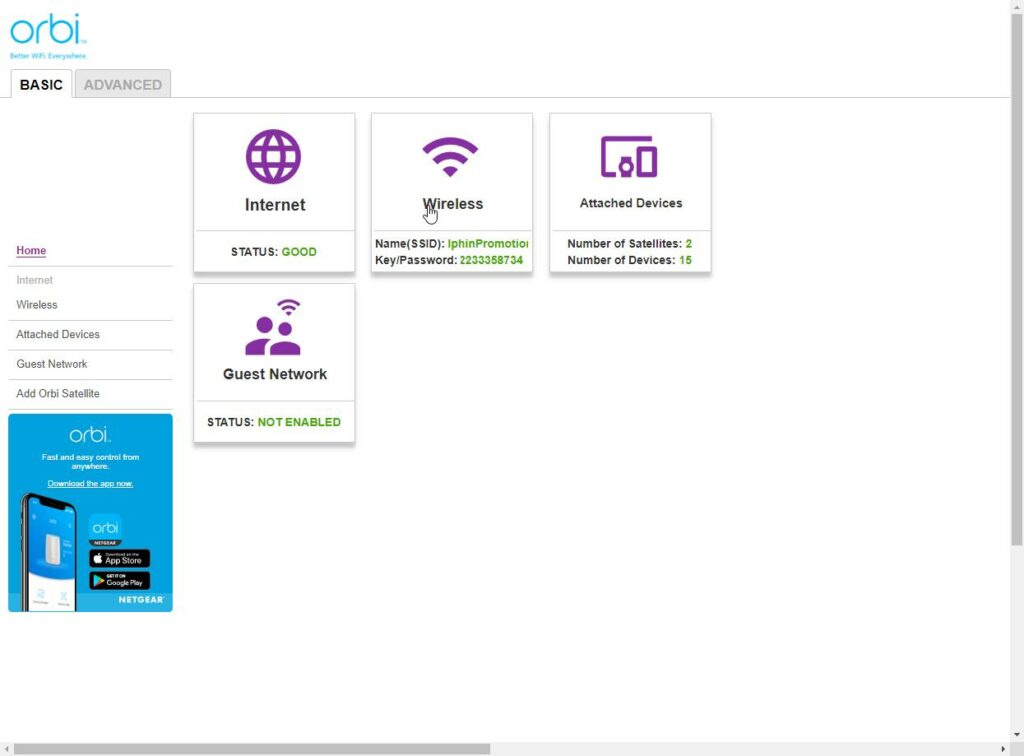
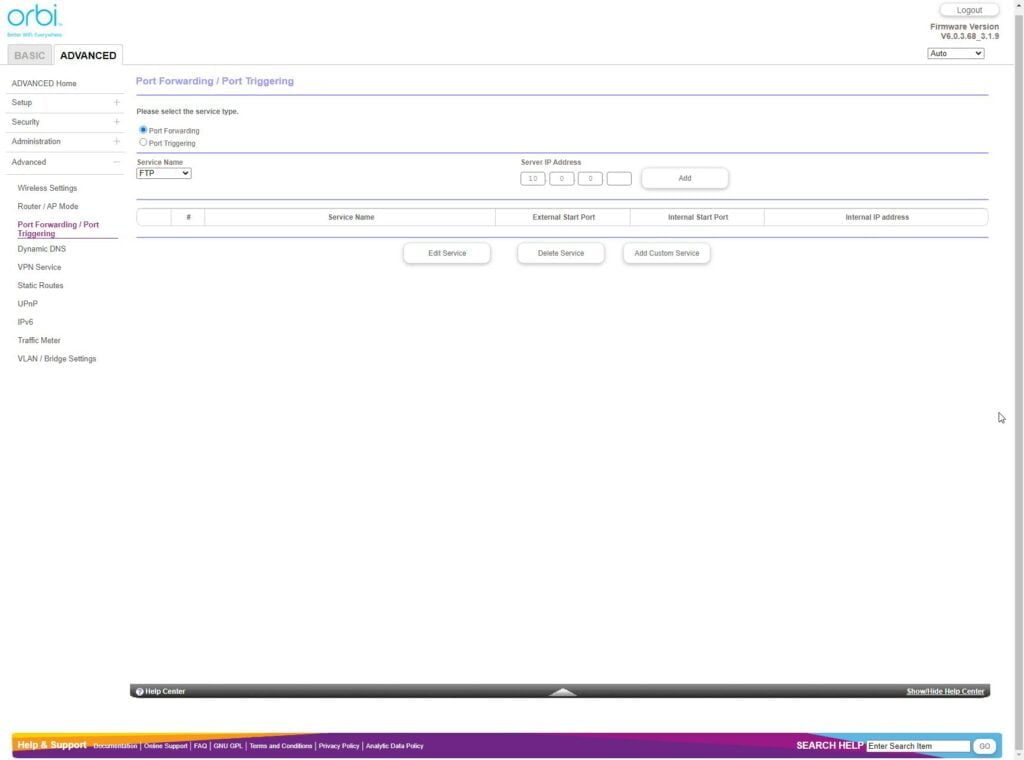
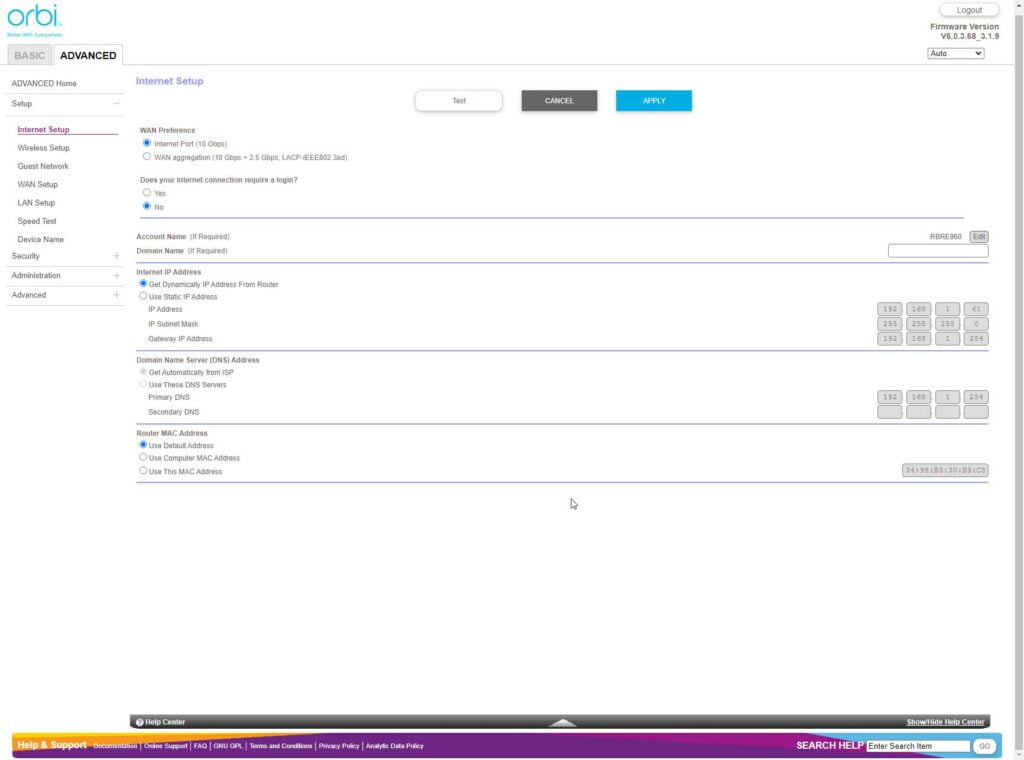
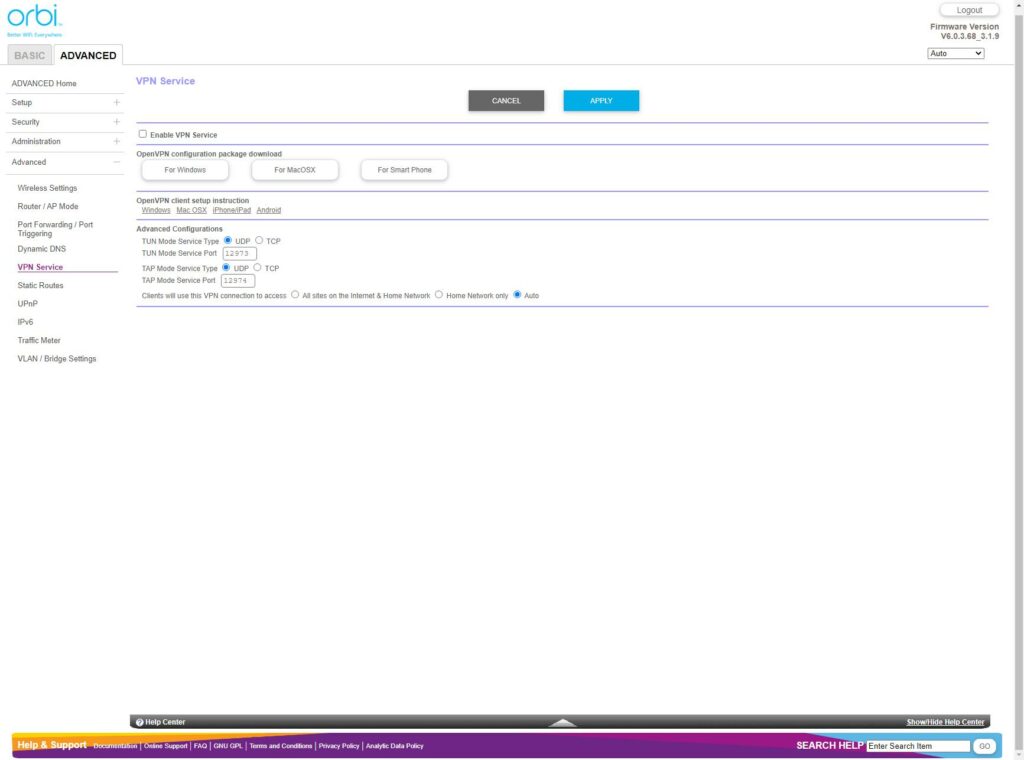
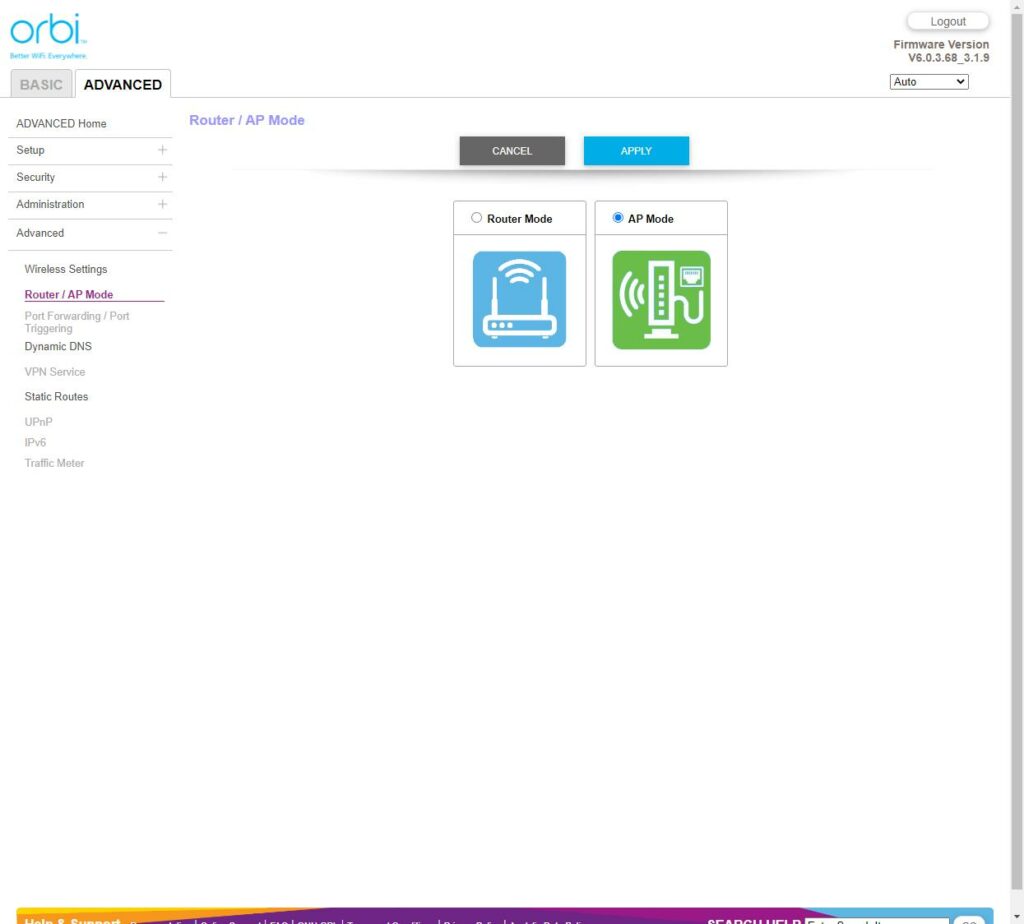
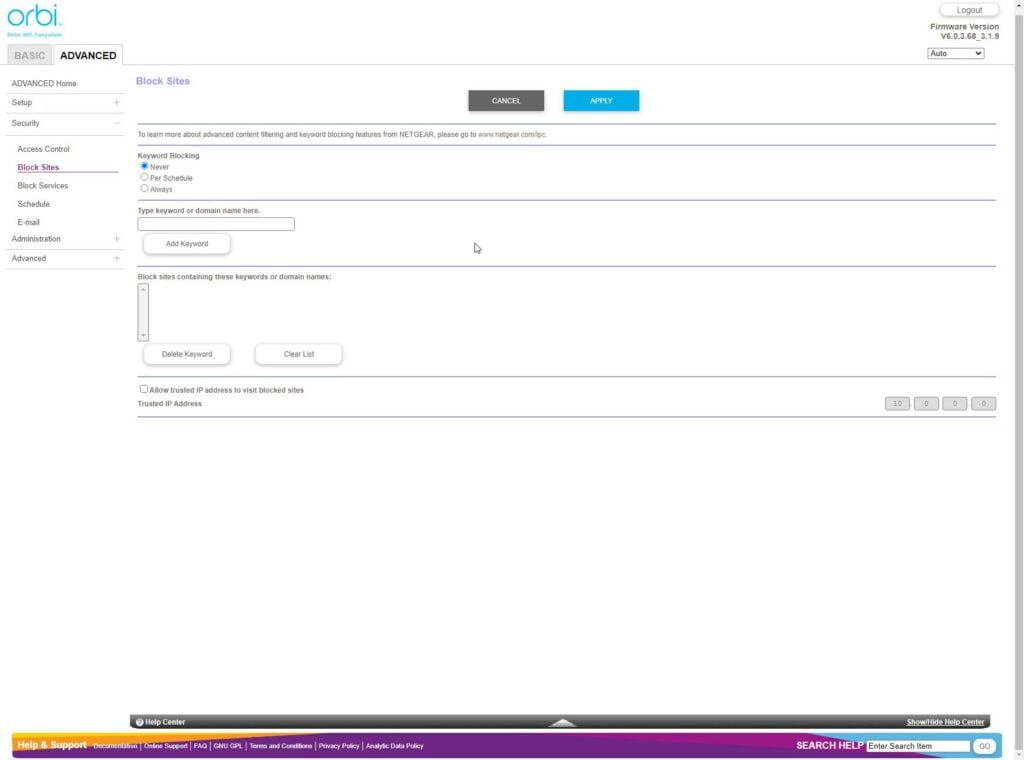
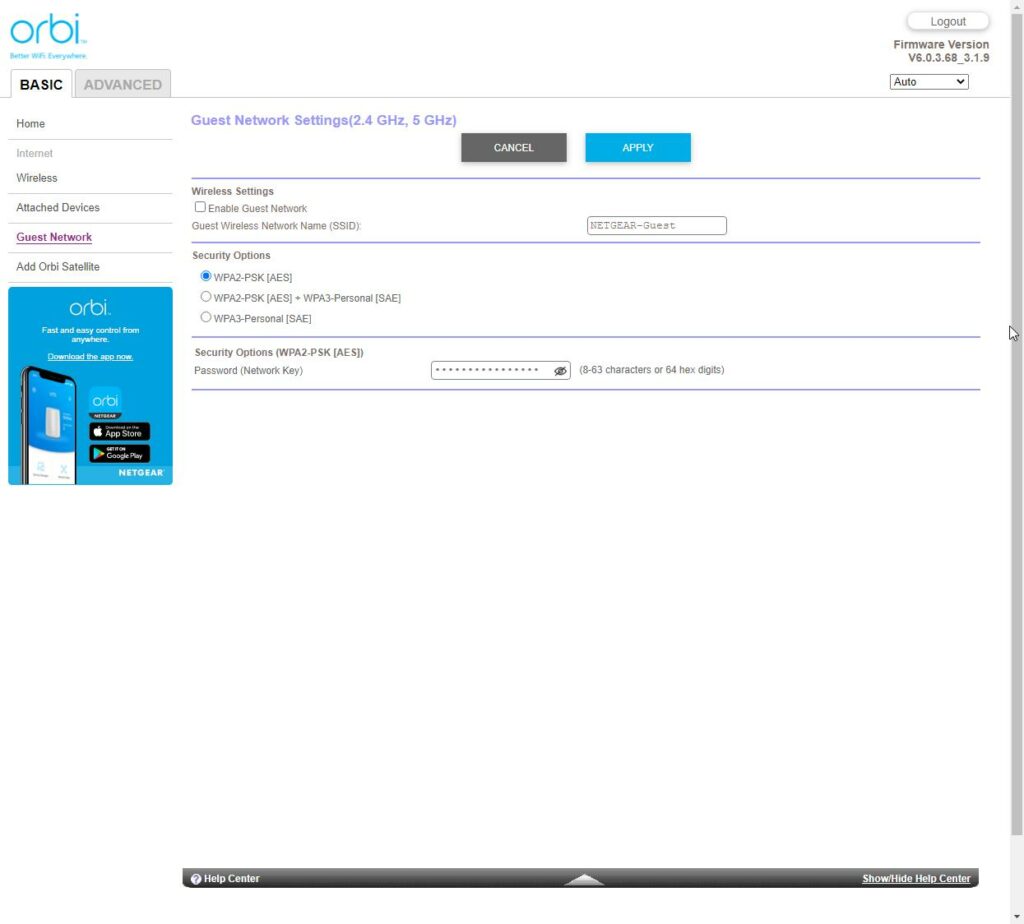
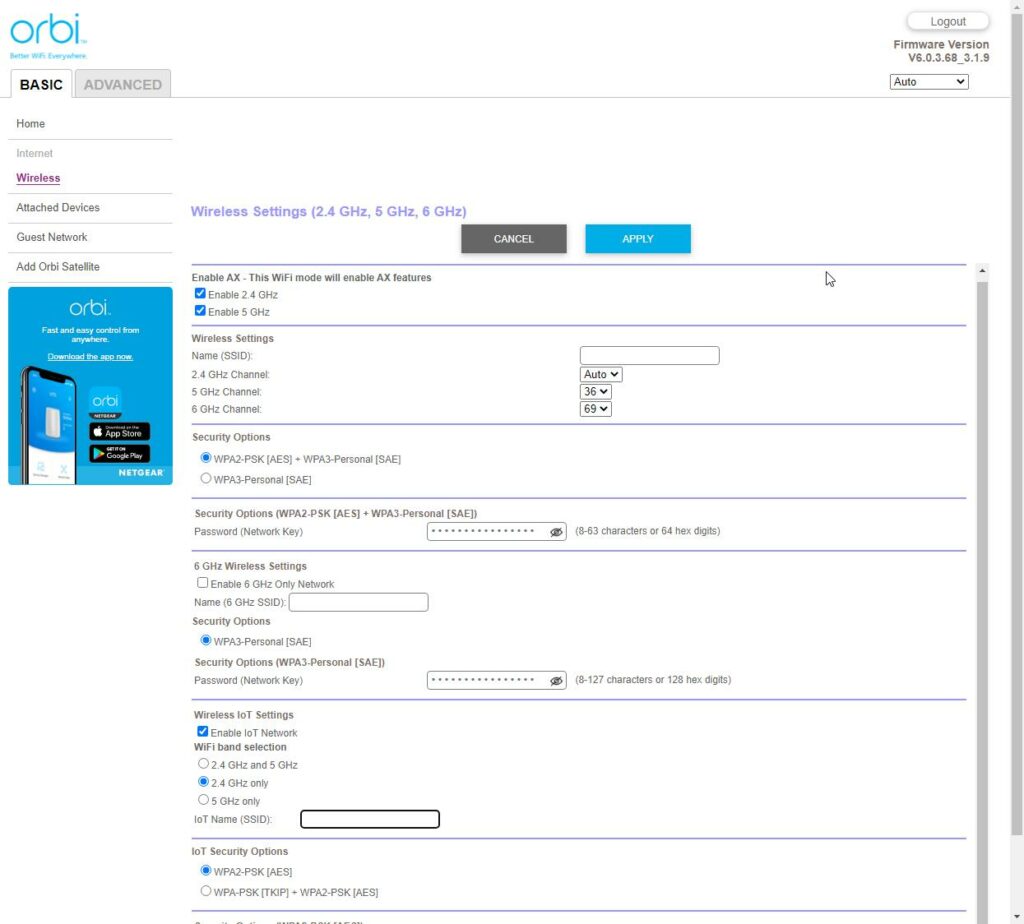
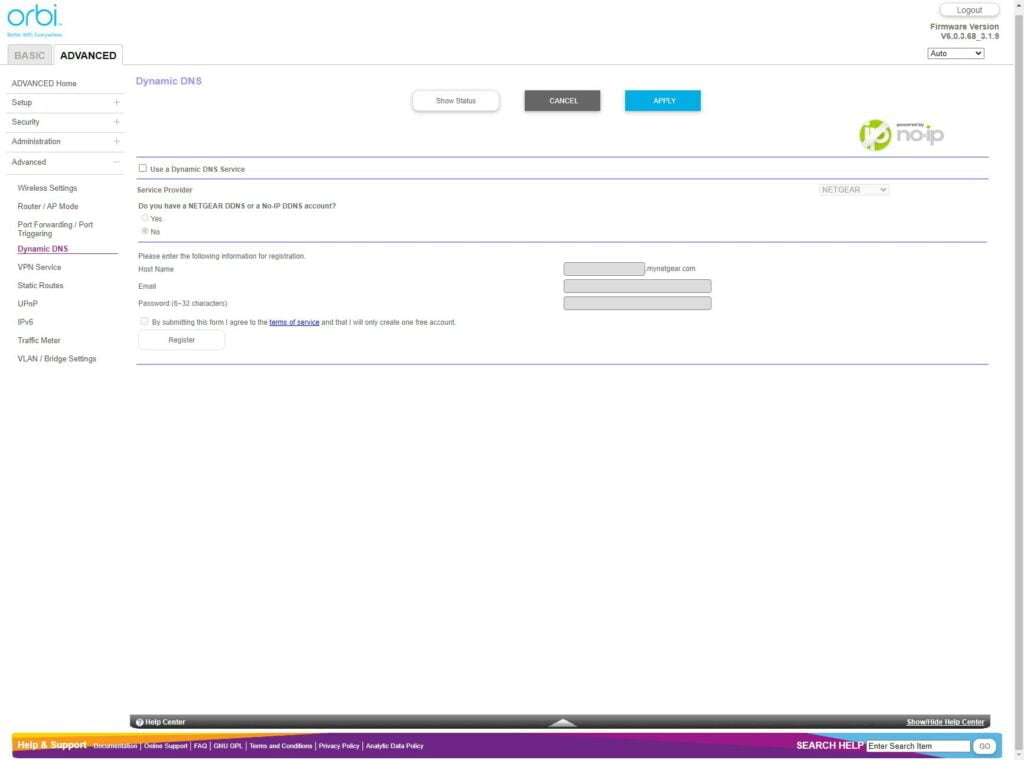
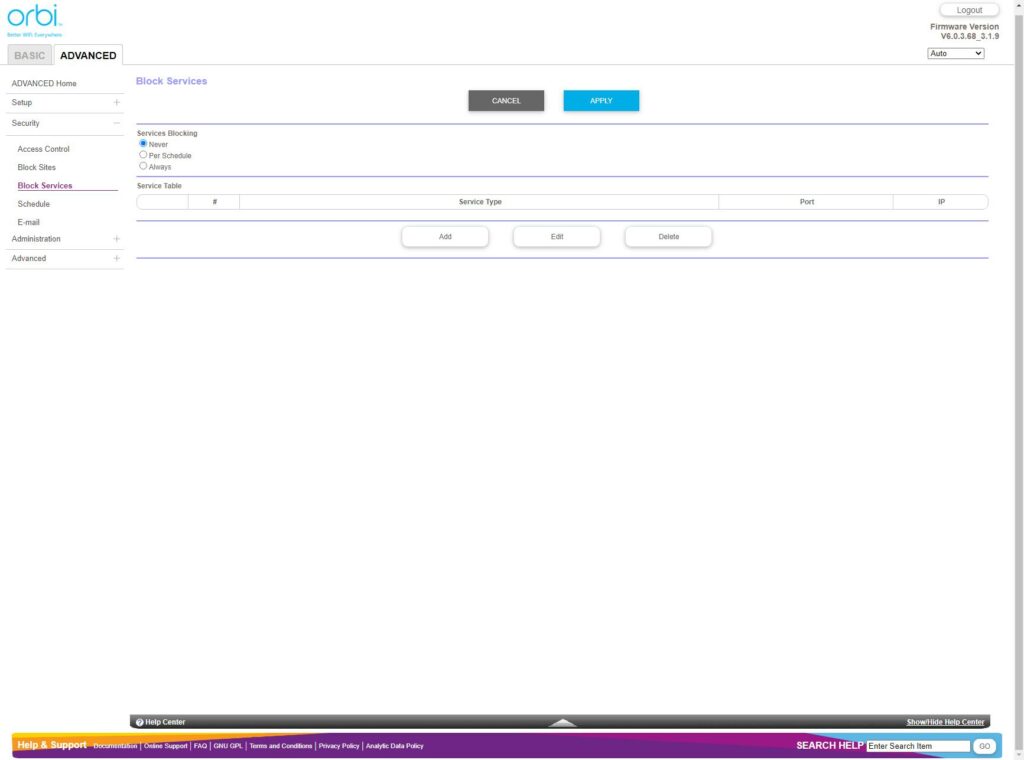
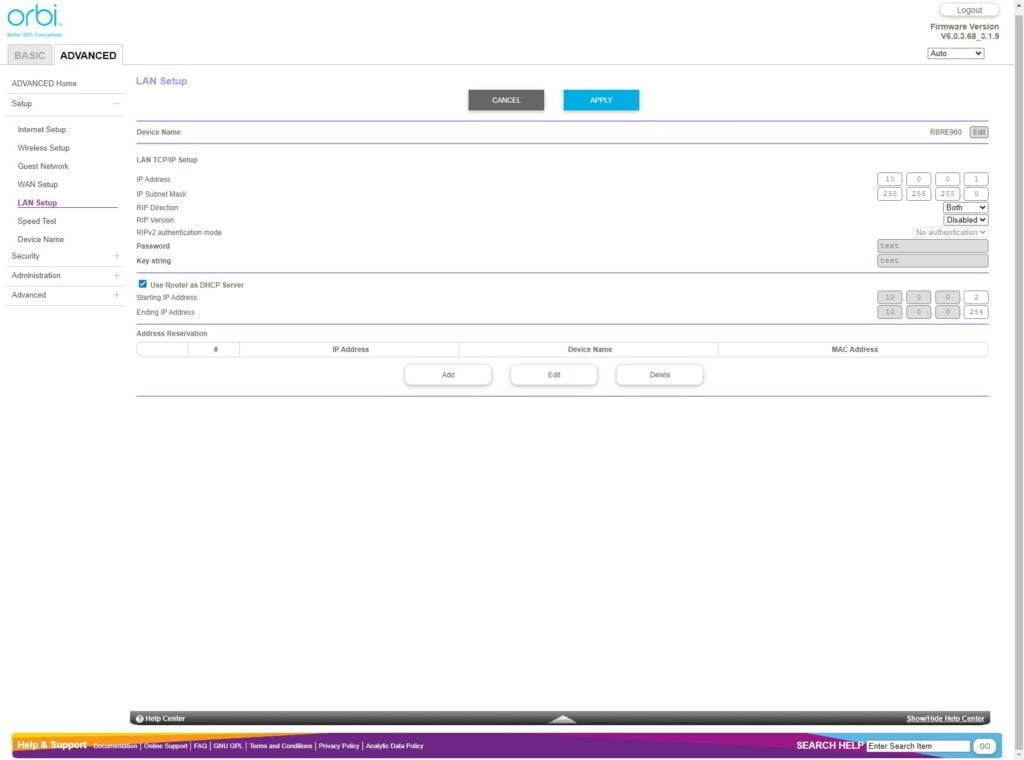
Devices that support 6Ghz WiFi 6E
Many mid to high-end laptops that launched in 2021 or this year will have WiFi 6E built-in. You can also upgrade your laptop with WiFi 6E (most of the time) and buy add-in cards for your desktop.
For mobiles, it is a bit confusing/annoying. The Qualcomm Snapdragon 888 features support for WiFi 6E, but it doesn’t guarantee it.
The Samsung Galaxy S21 series were the first phones to have it, but the Xiaomi Mi 11, OnePlus 9 Pro, Realme GT, OPPO Find X3 Pro and many do not support it.
Later in the year, the Pixel 6 series launched with support and the Redmagic 6s Pro but not the Redmagic 6R.
Therefore, as far as phones people are likely to use, it is just the Galaxy S21 and Pixel 6 series. This should hopefully improve with 2022 flagship phones, but it doesn’t guarantee it. As far as I can tell, the Xiaomi 12 lacks support.
Getting 6Ghz WiFi 6E to work
I had a bit of a nightmare here. It is likely a user error, possibly Windows but also possibly the settings within the Orbi.
I like to separate all my bands so I can always select the fastest, and it makes testing easier too. With the Orbi, the default SSID is locked to use both 5Ghz/6Ghz. You can set up a separate virtual SSID to be 6Ghz only, and this is restricted to WPA3, which is part of the WiFi 6E spec.
I stupidly assumed that when I selected a dedicated 6Ghz channel, the 5Ghz channel would also be separate.
With the dedicated 6Ghz channel, I could not get my Matebook 14 to see the SSID at all. This is apparently a known issue with 6Ghz. Possible causes are that Windows 10 doesn’t support WPA3 properly.
So I spent a couple of hours installing various drivers, reading registry hacks, I even swapped out the Intel AX210 M.2 with a different one. Eventually, I resigned myself to upgrading to Windows 11.
With this installed, I was able to see the 6Ghz SSID, but for whatever reason, I can’t connect. Which again, seems to suggest a WPA3 problem.
Eventually, when poking around all the settings, I realised that the main SSID is always 5Ghz/6Ghz, and I was able to connect to that successfully with 6Ghz. This isn’t without issue either, sometimes even when in the same room, my laptop will use the 5Ghz band rather than 6Ghz (even with preferred bands selected).
All these issues seem to be Windows (or Matebook) related, I didn’t have any problems with my Pixel 6. This includes using the dedicated 6Ghz SSID.
WiFi Performance
6Ghz WiFi 6E Performance
With 6Ghz working, I was able to achieve the impressive results I had expected.
In the same room as the primary router, my laptop managed 1.45Gbps, which is the fastest throughput I have ever achieved with any router. I previously achieved around 1.2Gbps consistently from the Netgear RAX120 with the 5Ghz set to 160Hz.
Moving into my front room with the wirelessly connected mesh satellite, I managed 900Mbps. I had hoped it might do a bit better, but it is still comfortably the fasted mesh performance I have ever seen.
Range isn’t quite as bad as I was expecting. Speed does drop off significantly. I had better results with my phone than with a laptop. The laptop would connect to iPerf and SpeedTest at around 300Mbps, whereas my phone would be 400-530Mbps with SpeedTest.Net.
5Ghz WiFi 6E Performance
The 5Ghz performance is up there with the best of the best, and one of the only devices I have tested that goes over 900 Mbit/sec on 5Ghz 80Mhz when testing with iPerf.
Range with 5Ghz is superb. I have always had problems extending the WiFi to my garage/gym and eventually resorted to running a Cat6 cable across my garden and putting an access point in there.
With the Orbi in my Kitchen, the WiFi signal easily reaches into my garage, providing over 200Mbps of throughput, which is more than enough for my Zwift indoor cycling sessions.
2.4Ghz Performance
I don’t personally pay much attention to 2.4Ghz, it is strictly used for IoT devices. With this, I managed 137 Mbits/sec from the router then
Price and Alternative Options
The Netgear Orbi RBKE960 series is currently only available in a 3-pack RBKE963 system priced at £/$1500.
There is no other all in one mesh system available with this specification or close to this price.
The older Orbi RBK853 still sells for £950, which is almost the same as the RRP when it launched two years ago.
The closest competitor would be to buy 3x Asus GT-AXE16000, which is set to launch in Q1 2022, priced at $649 or $1947 for a 3-piece system. It would technically be better specced than the Netgear with 2x10GbE and 1x2GbE on each device. On the downside, it is not a discrete design, and you’d have three of them in your house.
The Linksys Atlas Max 6E is a tri-band WiFi 6E system, so that’s the equivalent of dual-band systems we see with older technologies. This has an RRP of £1200 for a three-pack, which I think makes the Netgear RBKE963 looks reasonably priced.
Overall
I think the most important part of my conclusion is that this is the fastest mesh system and router I have ever tested.
I think most of the issues I experienced are mainly teething problems with WiFi 6E itself rather than anything wrong with this system.
It is not perfect though, the mobile app is dumbed down with the most basic of settings. Netgear Armor and smart parental controls all incur extra fees, and the web interface isn’t quite as feature-rich as some routers. However, I think the settings available should be more than enough for 99% of users.
It is hard to overcome the massive price, but as I highlighted in my alternative options, nothing is competing with this system. The Asus GT-AXE16000 isn’t out yet, will cost more and won’t be as easy to set up. The Linksys is not as good as this system, but it is only $300 less. Therefore, comparatively, the Netgear RBKE963 isn’t insanely priced.
Overall, if you want the fastest WiFi possible with the easy-to-use plug-and-play nature of all in one mesh systems, the Netgear Orbi RBKE963 is the best there is.
Netgear AXE11000 WiFi Mesh System (RBKE963) Review Rating
Summary
If you want the fastest WiFi possible with the easy-to-use plug-and-play nature of all in one mesh systems, the Netgear Orbi RBKE963 is the best there is. It has the fastest throughput of any mesh system on the market and there is little to no competition, which somewhat justifies the price.
Overall
85%-
Overall - 85%85%
Pros
- The fastest throughput of any mesh system or router I have used to date
- 6Ghz runs at 160Mhz natively ensuring fast speeds across the home
- Fastest throughput for 5Ghz mesh systems I have tested
- Excellent range
- Multi-gig ports
Cons
- WPA3 / 6Ghz appears to have teething issues with Windows
- Very expensive
I am James, a UK-based tech enthusiast and the Editor and Owner of Mighty Gadget, which I’ve proudly run since 2007. Passionate about all things technology, my expertise spans from computers and networking to mobile, wearables, and smart home devices.
As a fitness fanatic who loves running and cycling, I also have a keen interest in fitness-related technology, and I take every opportunity to cover this niche on my blog. My diverse interests allow me to bring a unique perspective to tech blogging, merging lifestyle, fitness, and the latest tech trends.
In my academic pursuits, I earned a BSc in Information Systems Design from UCLAN, before advancing my learning with a Master’s Degree in Computing. This advanced study also included Cisco CCNA accreditation, further demonstrating my commitment to understanding and staying ahead of the technology curve.
I’m proud to share that Vuelio has consistently ranked Mighty Gadget as one of the top technology blogs in the UK. With my dedication to technology and drive to share my insights, I aim to continue providing my readers with engaging and informative content.

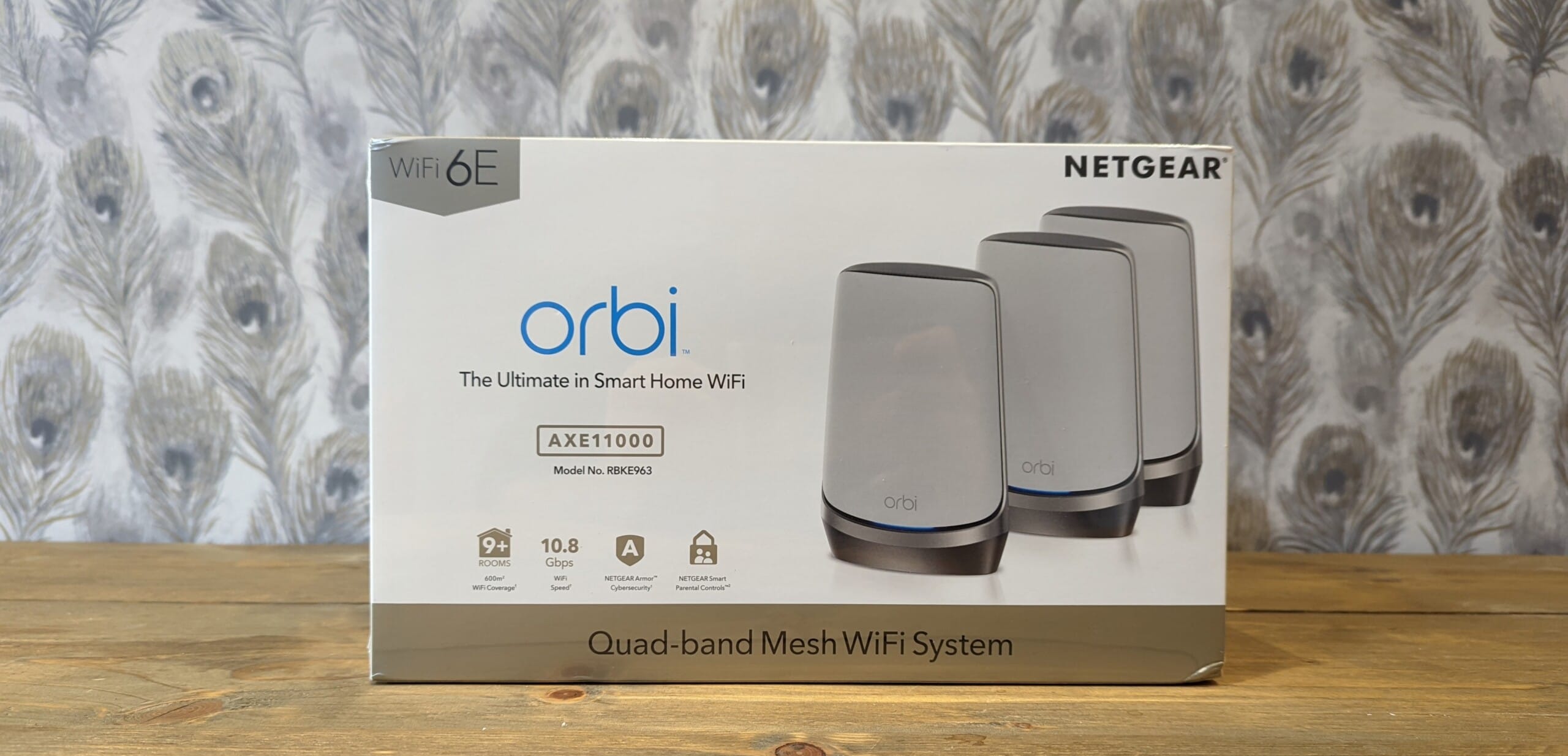
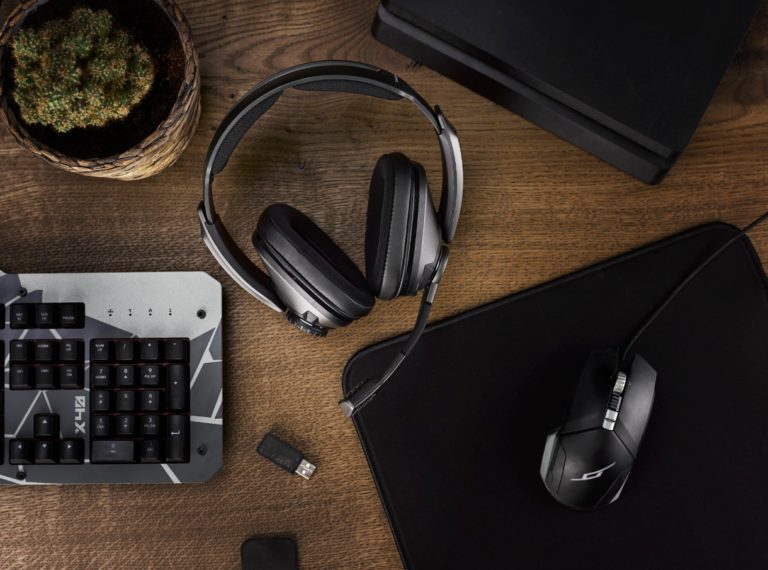
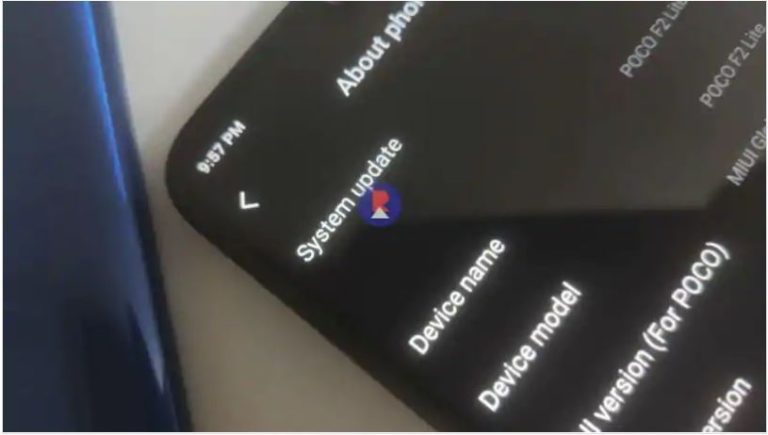

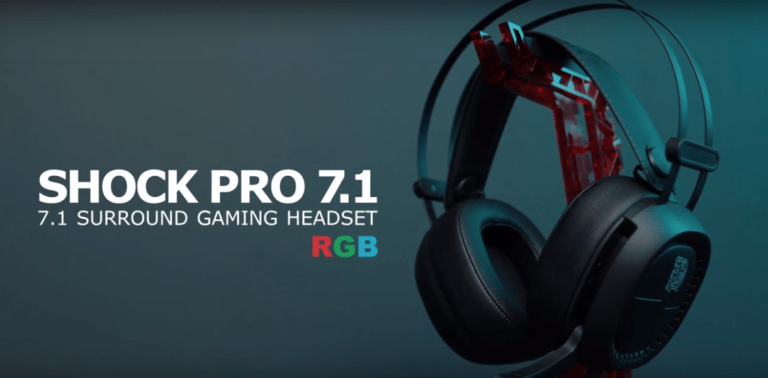
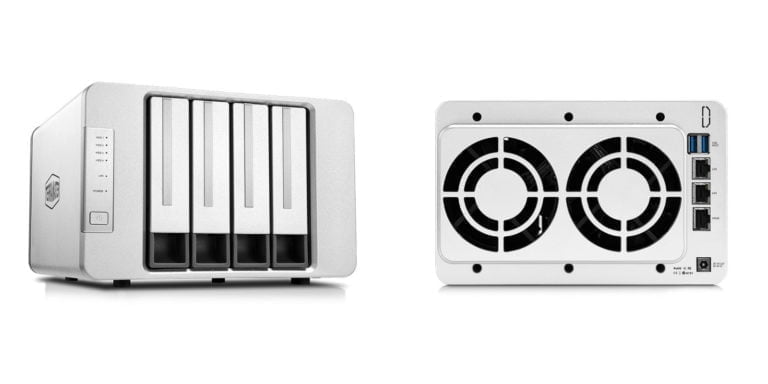
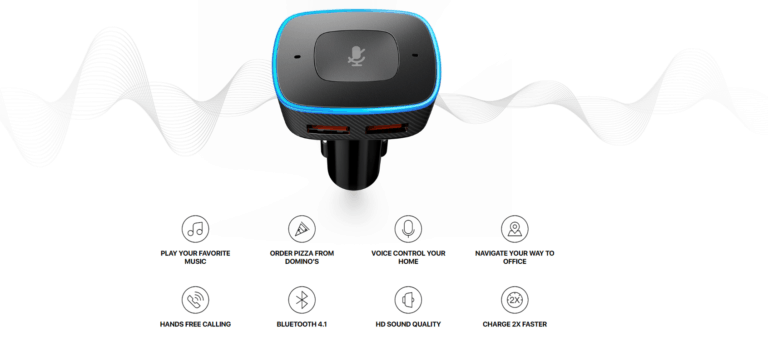
Did you test the Orbi in AP mode. My recent testing with Orbi in AP mode is that backhaul does not work at all. I wish someone would call them out for in a review.
This is how I use them for most of the speedtests and for personal use, but I will retest and confirm
An excellent review.
Could you review the ASUS XT12 Mesh system and also compare that to this Netgear Orbi RBKE system?
Thanks for the comment. I’d love to, but the ASUS PR team don’t seem to want to work with me!
Oh I see. I was impressed by this Netgear RBKE system and trying to decide between that and the Asus XT12. Bit of a conundrum.
Keep up the great reviews.